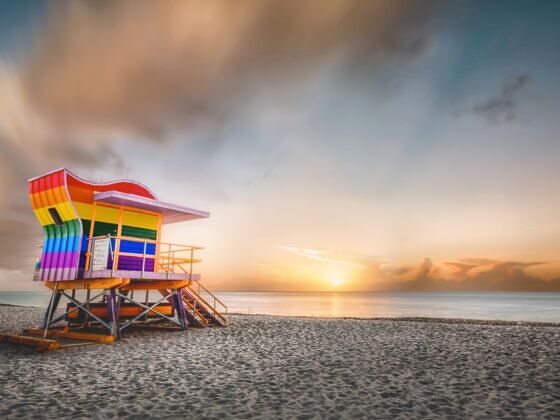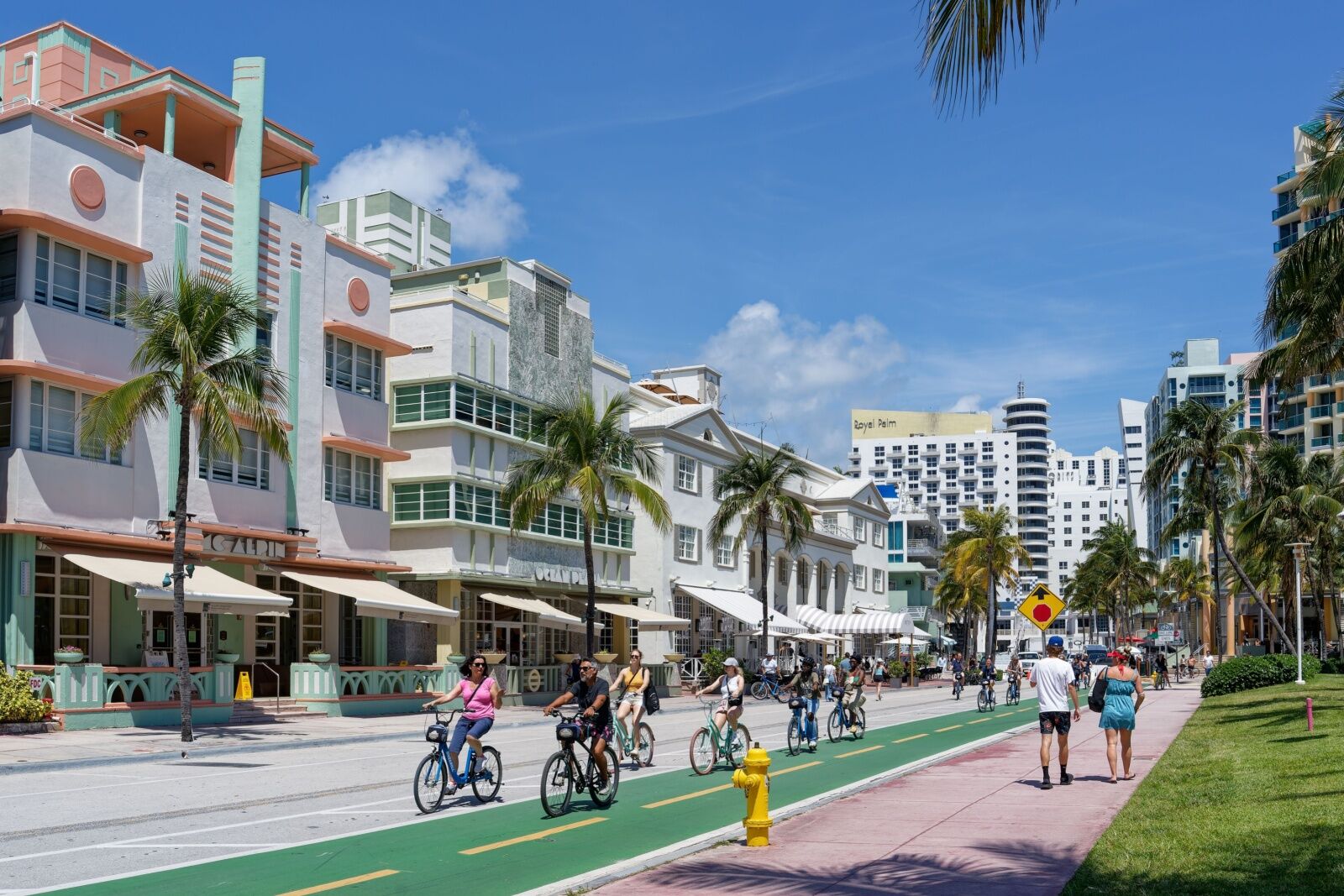Sun-drenched Florida is known for several things: “The Sunshine State” has some of the US’s most celebrated beaches along its 1,350-mile coastline, beloved tourism destinations like Disney World and Key West, and a real-life “endless summer” vibe so associated with the state that you’ll find it on thousands of residents’ license plates.


A State Tourism Website Erased Its LGBTQIA+ Marketing. Here’s Why That Matters.
But what Florida’s state government is also known for is not being so LGBTQIA-friendly, at least as of the last few years. The current governor has seen more than 20 pieces of LGBTQIA-related bills move through his legislature, including an expansion of the law notoriously dubbed the “Don’t Say Gay” bill. Supporters say it stops teachers and students from discussing “sexual orientation or gender identity” at an early age, while critics say it marginalizes LGBTQIA+ students and makes them think they need to hide who they are.

The writer lives in Miami, a city very welcome to LGTBQIA+ tourists. Photo: Rosemarie Mosteller/Shutterstock
I’ve lived in Miami Beach since 2020, and I’m often asked by friends how I ended up in conservative Florida. Miami Beach is liberal and culturally diverse, but it sometimes feels like it’s in a chic, Art Deco-cocoon, distinct from the rest of Florida’s reputation. For me, living in Miami Beach means coming to love the frenetic pace of the city, spending time on the gorgeous beaches, and waking up each morning to the chirps of tropical birds.
But in August 2024, the state’s tourism site, Visit Florida, quietly removed its LGBTQIA+ travel section. It was quickly noticed by both media sources and sleuthy online communities. After a week of backlash, Visit Florida CEO Dana Young explained the decision to ABC News: “It’s fairly simple. Visit Florida is a taxpayer funded organization. Our marketing strategy, our materials and our content must align with the state.” While it makes sense that an organization funded by taxpayer money needs to follow directives of the government, it wasn’t enough of an explanation for some residents. Colin Lienhard, a Miami-based architect and designer, shared his take with The New York Times, stating “it’s another example of them trying to erase that we are here.”
This decision, which I understand was likely not Visit Florida’s choice, is another step on a path that continues to make Florida seem less and less friendly to members of the LGBTQIA+ community. I worry that the way I see Miami Beach – as a vibrant, colorful, and welcoming place to live – isn’t the same as how outsiders view Florida. That’s felt especially true since the COVID pandemic, which seems to have ushered in a more politically tense climate than the state has had before.
But Young’s response implies that Florida’s tourism resources hinge on political whims, which is problematic. The state’s residents are not a monolith, and my fellow Floridians represent a wide range of views and political leanings. Sure, some parts of the state may not be especially welcoming to non-traditional social leanings, but many parts of the state are, and I’d bet that the majority of Floridians are extremely welcoming and friendly to everyone.
But all that aside – removing LGBTQIA+ trip-planning information from the state’s tourism website completely fails to acknowledge that many tourists coming to Florida are LGBTQIA+, and seems to accept that the state is willing to lose their important tourism money for the sake of making a political point.
On the surface, I haven’t felt any negative effects of this decision (or any similar decisions in the state), and I’m fortunate enough to continue to live a calm, safe, and healthy life in Florida. However, I’m aware of my privilege and the benefits of living in my Miami Beach bubble, settled into a socio-economic tier that insulates me from the impacts of decisions that could disempower already marginalized groups, including the LGBTQIA+ community.
Does a state tourism website require a section on LGBTQIA+ travel? Absolutely not. But that’s not the point. It’s peculiar that Florida, a state that benefits greatly from having LGBTQIA+ hot spots like South Beach in Miami and Wilton Manors in Fort Lauderdale, would remove all travel-planning tips and mentions of LGBTQIA+ culture in those places. It would be like removing all mentions of alligators on the page about Everglades National Park.
I worry that it’s positioning Florida as being unwelcoming to its many diverse visitors – and other states noticed, too.
Colorado governor Jared Polis, the first openly gay man elected governor in US history, shared a response on Facebook that called Florida out directly. “Hello gay tourists! Since Florida doesn’t want you, come on over to explore what Colorado has to offer.
Notably, he ended the post with “And you’ll have a gay old time.”
Polis’s statement highlights a clear distinction from Young’s words: tourism relies on travelers’ wallets, not local taxpayers’ pockets. So decisions should be made on what brings the most travelers and visitors to a state, not a political agenda.
Illinois joined in as well, with official tourism website Enjoy Illinois adding to its home page a blurb with the headline, “Lack of Love in the Sunshine State? Come to Illinois!” The blurb ends with a clickable button marked “Plan Your LGBTQIA+ Adventure (Take Notes, Florida).” It didn’t take long for Illinois’s governor, J. B. Pritzker, to speak up on social media as well, asking “Who’s really welcome in the Sunshine State?”
According to the Visit Florida website, the organization is “not a government agency, but rather a not-for-profit corporation.” That seems like a distinction that would make it easy for it to insulate itself from politically motivated decisions, or at least make a strong case for being able to make decisions based on travelers’ needs alone. In fairness, Young is a CEO, not a politician, and for all I know, she fought to preserve Visit Florida’s LGBTQIA+ content. But being taxpayer funded shouldn’t mean the government makes all the decisions – the general populace of Florida should get a say as well, which includes not just many LGBTQIA+ people, but many more who support them.
It’s worth mentioning that local city tourism sites, like the official website of Greater Miami and Miami Beach, continue to devote a travel section to LGBT visitors, and Fort Lauderdale’s tourism site has an entire header tab devoted to diversity and inclusion. Visit Florida is not obligated to make similar efforts, but as a tax-paying resident, I wish my tax dollars were being used to promote Florida as a welcoming destination for all visitors.
Will gay people still come to Florida and have a great time? Of course. But it’s part of a domino effect of well-publicized state government decisions in recent years that feel designed to depict Florida as a homogenous society with little to no diversity, complexity, or nuance. I urge readers (especially those in Florida) to research the issue and speak up in their own states whenever there’s a chance to support open-minded and welcoming tourism messaging. Historically, censorship and silencing of minority communities can lead to intolerance and hate – something I never want to see associated with my beloved state of Florida.
The author reached out to Visit Florida for additional comment, but did not hear back by the time of publication.